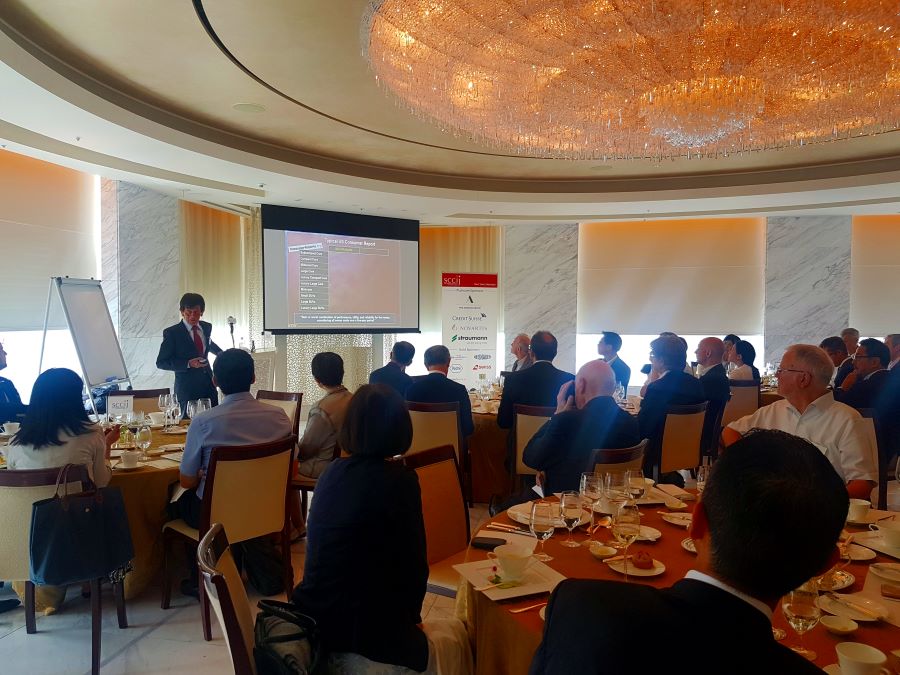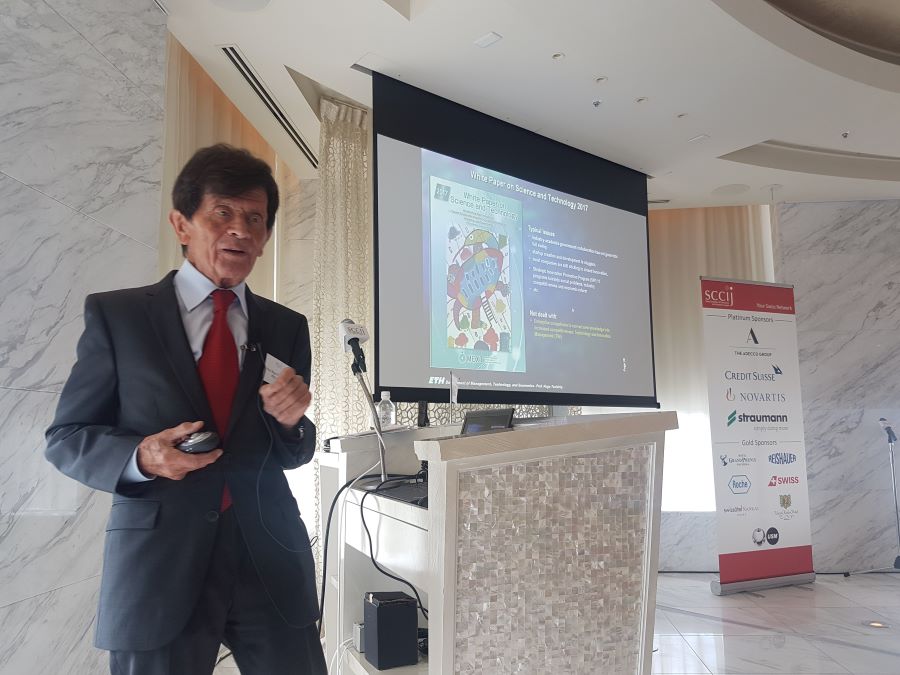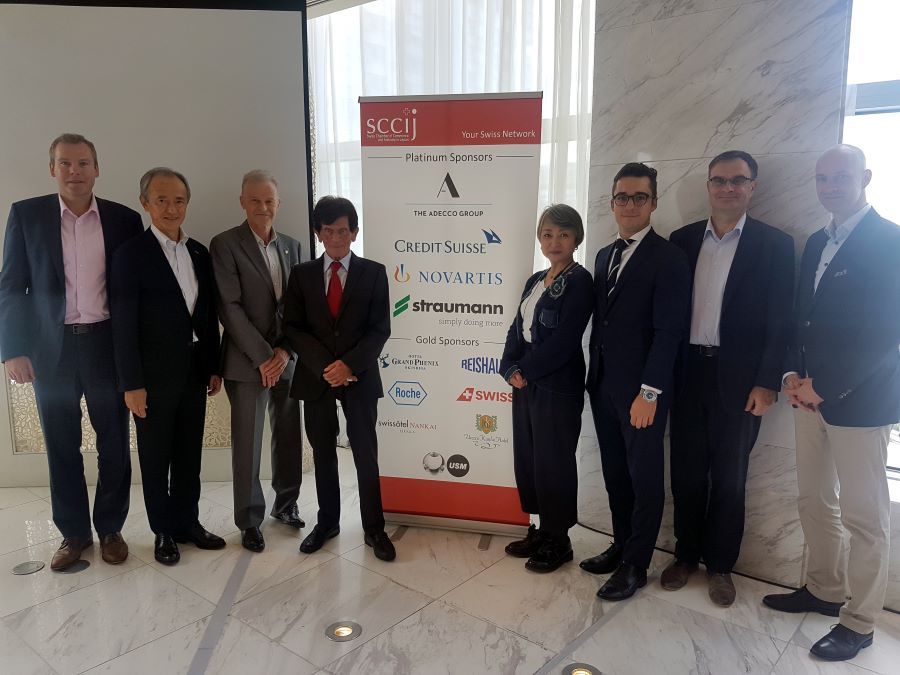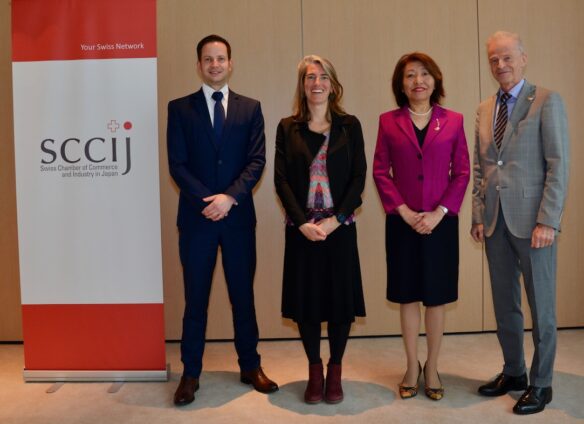Tokyo (SCCIJ) – At the July Luncheon, Professor Hugo Tschirky, a renowned Swiss expert for the management of technology, offered much food for thought about the scientific innovation and technological leadership of nations and companies. He impressed more than 40 members and guests of the SCCIJ with a central insight: Basic knowledge gathered by researchers only enhances the competitiveness of private companies under certain conditions. He called this the “final mile.” In particular, companies’ technology and innovation management competencies have to reach a point where business decisions coincide with customers’ buying choices.
Fostering innovation
All significant nation-states are undertaking enormous efforts to strengthen competitiveness on both the national and the entrepreneurial levels, Professor Tschirky said at the start of his luncheon talk. For this goal, they would invest in the creation of technological innovation. Usually, such efforts would consist of research programs in relevant fields such as life sciences, energy, the environment, robotics, and information technology.
In Japan, the “Council for Science and Technology Policy” expressed already in 2010 a leading vision for the island nation. For example, Japan should achieve sustainable growth, use science and technology (S&T) as the foundation for national survival, and continue to create “knowledge” assets and fosters S&T as a culture. “Japan’s primary concern is to maintain its top position,” Professor Tschirky said. At the same time, Europe and the U.S. have also set similar strategic innovation goals for themselves.

SCCIJ July Luncheon
"Management of technology"
All significant nation-states are undertaking enormous efforts to strengthen competitiveness on both the national and the entrepreneurial levels, Professor Tschirky said at the start of his luncheon talk. For this goal, they would invest in the creation of technological innovation. Usually, such efforts would consist of research programs in relevant fields such as life sciences, energy, the environment, robotics, and information technology.
In Japan, the “Council for Science and Technology Policy” expressed already in 2010 a leading vision for the island nation. For example, Japan should achieve sustainable growth, use science and technology (S&T) as the foundation for national survival, and continue to create “knowledge” assets and fosters S&T as a culture. “Japan’s primary concern is to maintain its top position,” Professor Tschirky said. At the same time, Europe and the U.S. have also set similar strategic innovation goals for themselves.

SCCIJ July Luncheon speaker Professor Hugo Tschirky
"Management of technology"
All their initiatives would have at least three topics in stock, the speaker argued. First, they all express grave concerns regarding the current competitiveness and innovation competence of their countries. Second, they propose numerous measures – including large-scale research projects – to improve an economic situation perceived as unsatisfactory. However, third, all of these significant measures do not refer to the contribution of private companies’ own innovation and technology competences.
Hence, those nations would launch such costly ventures under the unsaid assumption that increasing the amount of innovation-relevant knowledge will automatically enhance the competitiveness of companies. “In reality, it does not,” Professor Tschirky stated. The road from knowledge creation to successful knowledge application would depend on the “Management of Technology (MOT).” “MOT in practice represents a business process that transforms internally and externally available knowledge into improved and innovative products and services,” the speaker stated. “Finally, this will generate new sales and earnings.”
But typical currently practiced MOT would neglect the leadership side. Hence, more advanced MOT concepts should cover not just technical functions but instead, all entrepreneurial functions. In particular, new MOT concepts also embrace service issues, as a business today would be unimaginable without them. Updated MOT concepts also include components such as “technology intelligence” or “technology monitoring” systems. They focus particularly on possibilities to practice “open innovation.” “Such transfer of technologies and innovations from external sources to complement in-house R&D activities is wide-spread in Japan,” the speaker said.

Members and advisors of the SCCIJ board with Luncheon speaker Professor Hugo Tschirky
Comprehensive promotion of innovation
Enhancing innovativeness on the national and the entrepreneurial levels must focus on two complementary issues of equal weight, he argued. First, this task requires a business and social environment favoring the emergence and vitality of innovation and technology-driven enterprises. It also features universities capable of providing research outcomes that deliver improved and innovative product and production technologies as well as skilled and qualified human resources. Also needed are government institutions that co-finance innovation projects as well as venture capital activities, Professor Tschirky stated.
Second, the responsible institutions must launch initiatives to promote competitiveness and innovativeness, which effectively support and improve the technology and innovation competence of the “Final Mile.” In these contexts, the speaker suggested two approaches. First, in the long term, current-practice MOT concepts towards the management of technology and innovation-driven companies should be upgraded. Second, in the shorter time frame, professionally guided, self-learning “Communities of Practice” among companies should help to acquire and share new technology and innovation management approaches.
Text: Martin Fritz for SCCIJ, based on the essay “Enhancing Japan’s Innovativeness? It’s the “Final Mile” that counts” by Professor Hugo Tschirky; Photos: SCCIJ





























